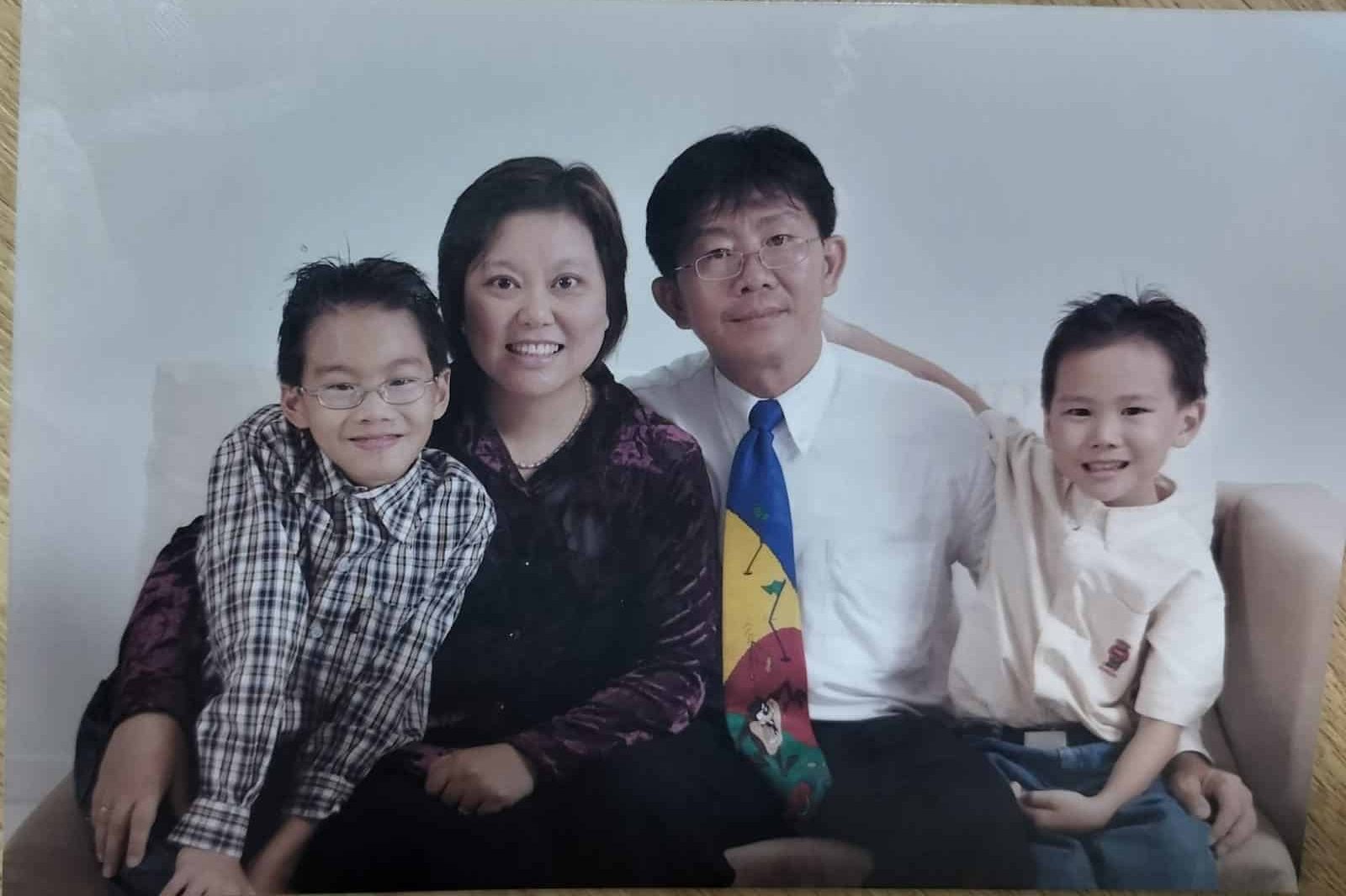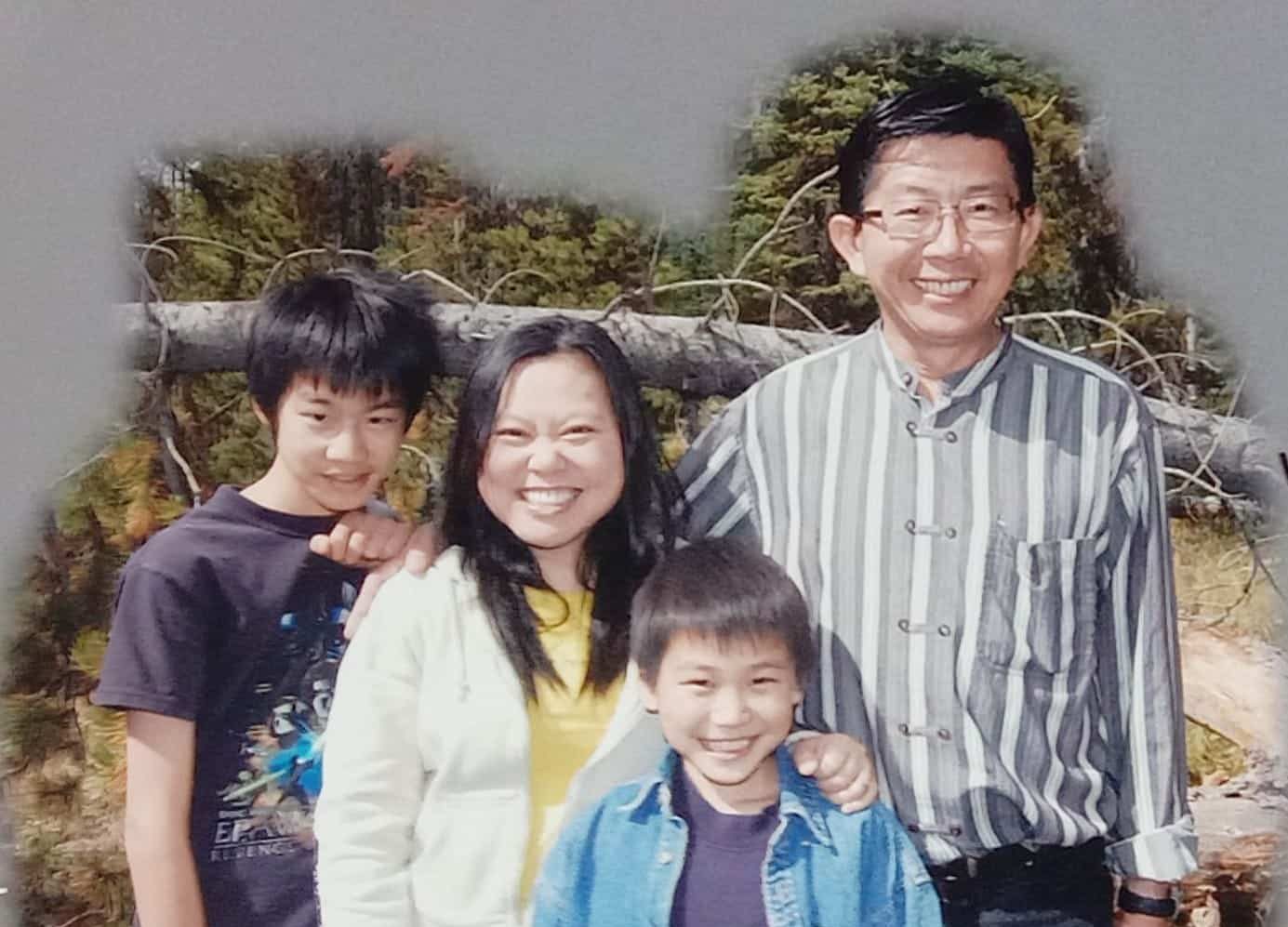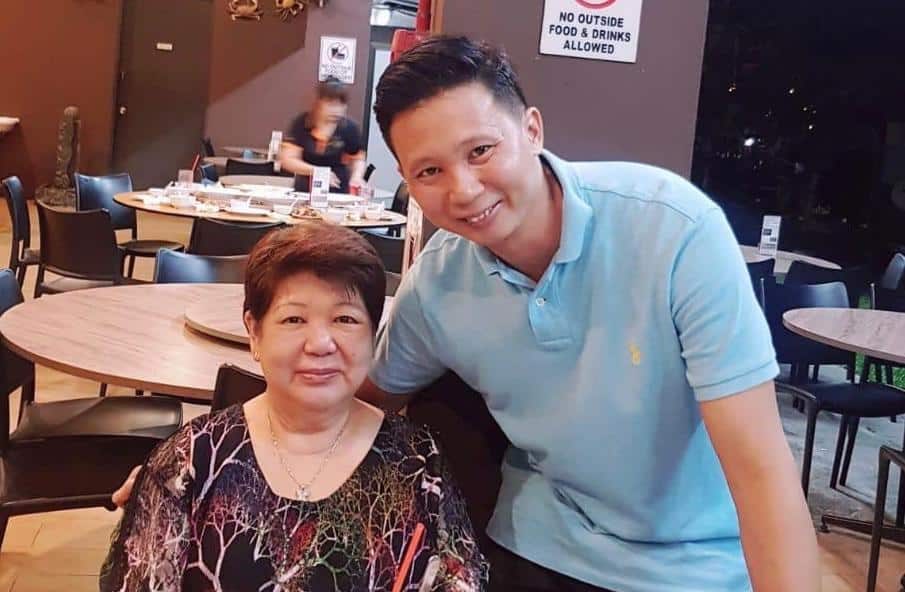Drugs made him lose his family, God restored their relationship: The work of The Helping Hand that you can support this mooncake festival
by Christine Leow // August 27, 2021, 12:53 pm
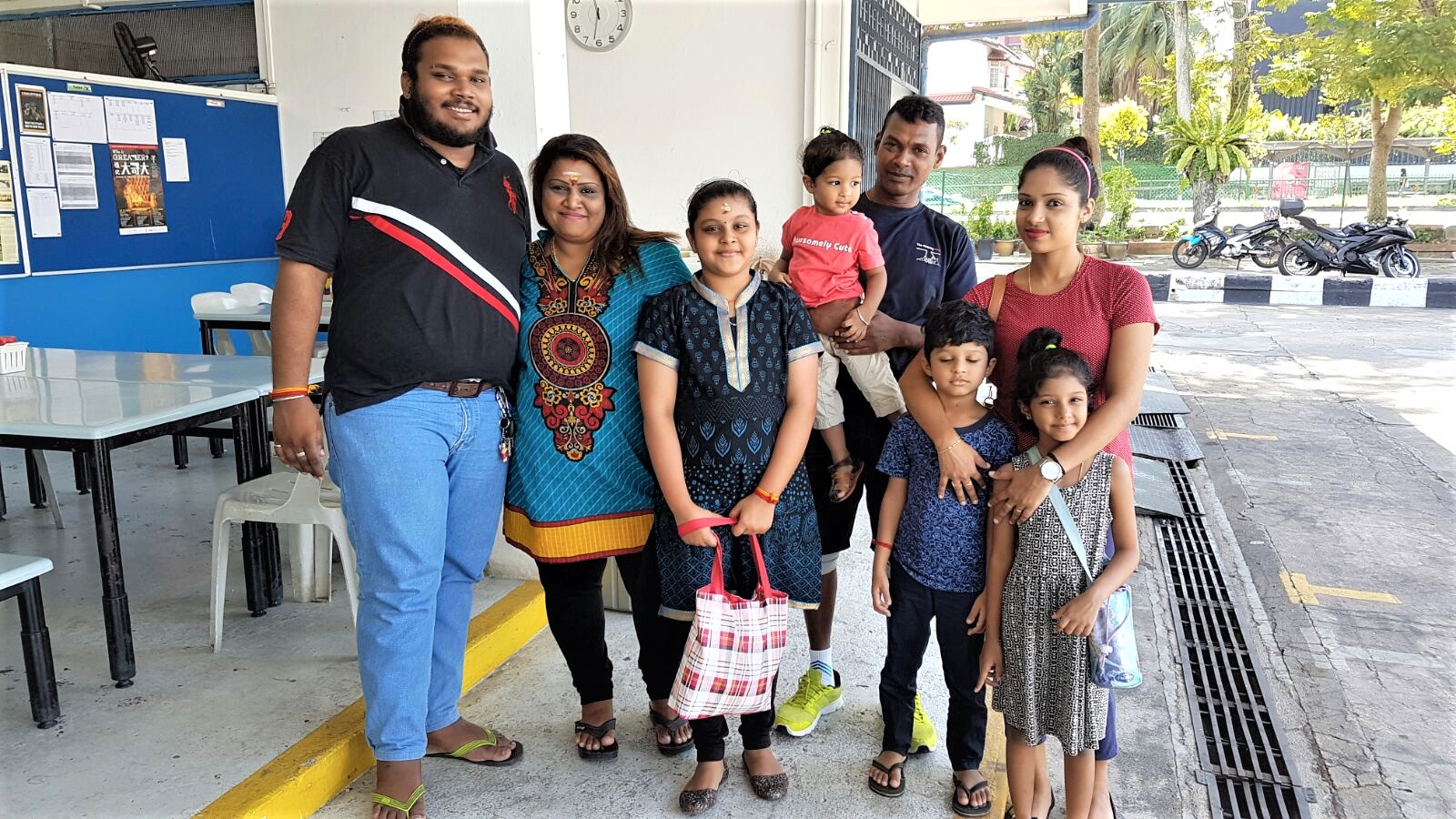
Kumarakuru Arunasalam (carrying child) with his sisters and their families. His mother, angered by his decades of drug addiction, had cut off ties with him and it was The Helping Hand that helped him kick the habit and even track down his mother. Today, the family is reconciled. Photo courtesy of Kumarakuru Arunasalam.
For the first time in nearly 30 years, Kumarakuru Arunasalam felt truly free of drugs. He had been clean before but this time it felt different.
Proud of himself, and armed with gifts and even a little money, Kumar returned home to his mother. He had not seen his family for five years. Now, he was ready to show them the changed man he had become.
When he got to his family home, he discovered that his mother had sold the flat and left no forwarding address.
But when he got to his family home, he discovered that his mother had sold the flat and left no forwarding address. That was in 2013.
“They left me alone. I had no home to live in anymore,” said Kumar, now aged 52.
He did not know where his mother had gone and had lost touch with his siblings – an older and a younger sister. He would have been all alone in the world had it not been for The Helping Hand.
“I lived at THH. The staff, they really love me, encouraged me. During holidays, my boss and my colleagues would take me out, invite me home to eat with their own families.
“They treated me like family and changed my life.”
The playful boy
Kumar grew up a much-loved only son, doted on especially by his father.
“I was his favourite,” said Kumar.
His father worked at PSA Singapore and would often come home at midnight after his shift with chicken wings for Kumar’s supper.
“He would wake me up and wait for me to wake up to eat it. My father always took care of me.
“He would take me out, buy me lots of things. If he bought things for us, I would always get the first choice.”
“My mum would advise me, but I never went to school.”
Because both his parents worked – his mother was a gardener at Sentosa – Kumar and his sisters were left largely to their own devices.
When it came time to go to primary school, Kumar simply refused.
“They asked me to go to school but I didn’t. They sent me to school but I ran away.”
Kumar would instead spend his days at the void deck, playing by himself and then with the neighbourhood children when they came home from school.
“My mum would advise me, tell me that if I didn’t study, things would get worse when I grew up. But I never went to school.
“My father never caned me.”
By 12, Kumar found work at coffeeshops and provision shops to earn some money of his own. All this while, his parents had been giving him pocket money.
Dragged down by drugs
When Kumar was 16, his family moved to a different neighbourhood. There, he made new friends who introduced him to drugs.
“All of them were taking drugs. At first it was marijuana. I thought it was just a cigarette.
“If I had known it was drugs, I wouldn’t have taken it. I knew that if I was caught with drugs, I would go to jail.”
“I kicked the habit. But the day I was released, I went to find drugs again. In my head, I was still addicted.”
Soon, Kumar was smoking marijuana every day. While the drugs came free, Kumar would soon pay a high price for his addiction.
“One day, there was no marijuana. So, they say try other drugs. They gave me heroin.”
Unlike marijuana, heroin was highly addictive.
“When you never take, your whole body will ache, you cannot eat, cannot sleep,” recalled Kumar.
After the first two to three times, Kumar had to pay for his fix. Every pay cheque went to financing his addiction.
Within a year, he was arrested for drug consumption and sentenced to six months in prison. Incarceration cured him of his addiction momentarily.
“In prison, no drugs. For two weeks, I really struggled – body pain, not feeling well, can’t eat,” he told Salt&Light.
Kumar would be arrested and imprisoned 11 times in all. His longest sentence was seven years.
“After that, I was okay. I kicked the habit. But the day I was released, I went to find drugs again. In my head, I was still addicted.”
Kumar would be arrested and imprisoned 11 times in all. His longest sentence was seven years.
In between, he would work various jobs including as a petrol station attendant and a contractor. But his addiction made keeping any job difficult.
“My mum would cry and tell me to stop taking drugs but I never stopped. I felt bad but I still continued.
“My father was very sad. He was always very close to me. I know I made him sad.”
His father passed away in 2001 while Kumar was in prison. While he managed to attend the funeral, his father’s death affected him deeply.
The difference faith made
But it was not till 2006 that Kumar found the fortitude to fight his addiction and it was the Christian faith that gave him the strength to do it.
Serving yet another prison sentence then, Kumar was invited to a Bible study class by his cell mate. For reasons he cannot explain, he went. And he continued going week after week.
“Every Sunday,” said Kumar.
“My mum would cry and tell me to stop taking drugs but I never stopped.”
“At the Christian counselling, we share the Bible and I can feel the love of Christ. When I sang the song Open the Eyes of My Heart, I could feel God loving me. I cried.”
When Kumar became a Christian, he also became a changed man.
“I was happy, a different person, not like before. Before, I was angry most of the time. I often got into quarrels with my cell mates over misunderstandings.
“After I became a Christian, I changed. I became more humble.”
When Kumar was released from prison six years later, he was determined to stay off drugs. He found a job as a packer in a factory and made a point to stop seeing his old friends. He went to church faithfully every Sunday.
For six months, all was well.
Then, by chance, he crossed paths with a buddy from his old clique.
“When I became a Christian, I really wanted to surrender my life to God.” He walked into The Helping Hang on his own to get help.
“I went to a funeral with him and then we started to smoke, drink and take drugs together. He offered me. And that was it.”
Though he slipped, this time, there was a difference.
“When I became a Christian, I really wanted to surrender my life to God.”
So, one day in 2013, Kumar walked into THH on his own to get help. He had known about the half-way house for recovering drug addicts because he had worked at a petrol station nearby.
“I was getting worse and I knew that, this time, if I got arrested, my prison sentence would be very long because I was a repeat offender.”
A brotherhood of love
At THH, the staff helped Kumar kick his drug habit once more. He was sent to the Institute of Mental Health (IMH) for a three-week detoxification programme.
Then he was enrolled in the THH stay-in programme which included counselling, Bible study and a regimental lifestyle that kept him in check.
“At THH, I worked hard. I trusted God and changed my life.”
It was several months before Kumar was confident enough to face his family again. That was when he found out that his mother had cut off all ties with him.
“The first thing I said to her was, ‘Please forgive me.'”
Alvin Wong, operations manager at THH, remembers that Kumar “was very, very sad”.
Kumar spent the next two to three years at THH, getting his life on track, successfully graduating from their rehabilitation programme. There was just one missing piece in his life – his family.
“Our whole group of colleagues decided to help him locate his family and ask them to accept him back,” said Alvin.
In their own time, the band of brothers went back to Kumar’s old flat to ask around, and even visited his mother’s frequent haunts in the hope of bumping into her.
With some help, they found out that Kumar’s mother had medical appointments to keep. They staked out the polyclinics and finally managed to find her. The search took them three years.
“His mum was very angry with him,” said Alvin.
But they managed to convince her to see Kumar.
Said Kumar: “The first thing I said to her was, ‘Please forgive me.’ She was quiet at first because she was still very angry.
“Then, she said, ‘Don’t talk to me.’”
The happy ending Kumar had hoped for did not happen then. That would have to wait.
“I told her that it is because of God that I changed. God saved my life.”
In the meantime, he went to work at THH, met a woman through his colleague, got married in 2020 and bought a flat of his own.
“After I got married, I brought my wife to meet my mum. It was then that she really forgave me.
“She finally realised I had grown up and was serious about changing.”
He even got back in touch with his sisters who are married with children of their own. At their last family gathering, Kumar took everyone out for a meal.
“Mum was very happy.”
Now Kumar visits his 76-year-old mother every two to three weeks.
“She knows I’m a Christian and she is very happy for me because I told her that it is because of God that I changed. God saved my life.”
Proceeds of The Helping Hand mooncakes to help with rehabilitation
Since The Helping Hand started in 1987, the Christian halfway house that focuses on the rehabilitation of former drug addicts has helped more than 2,400 ex-offenders like Kumar.
To fund their programme and offer employment to their residents, THH offers various services – removal, disposal and delivery; painting and cleaning; restoration and sale of furniture; sale and redistribution of used items; and sale of orchids and home-baked products.
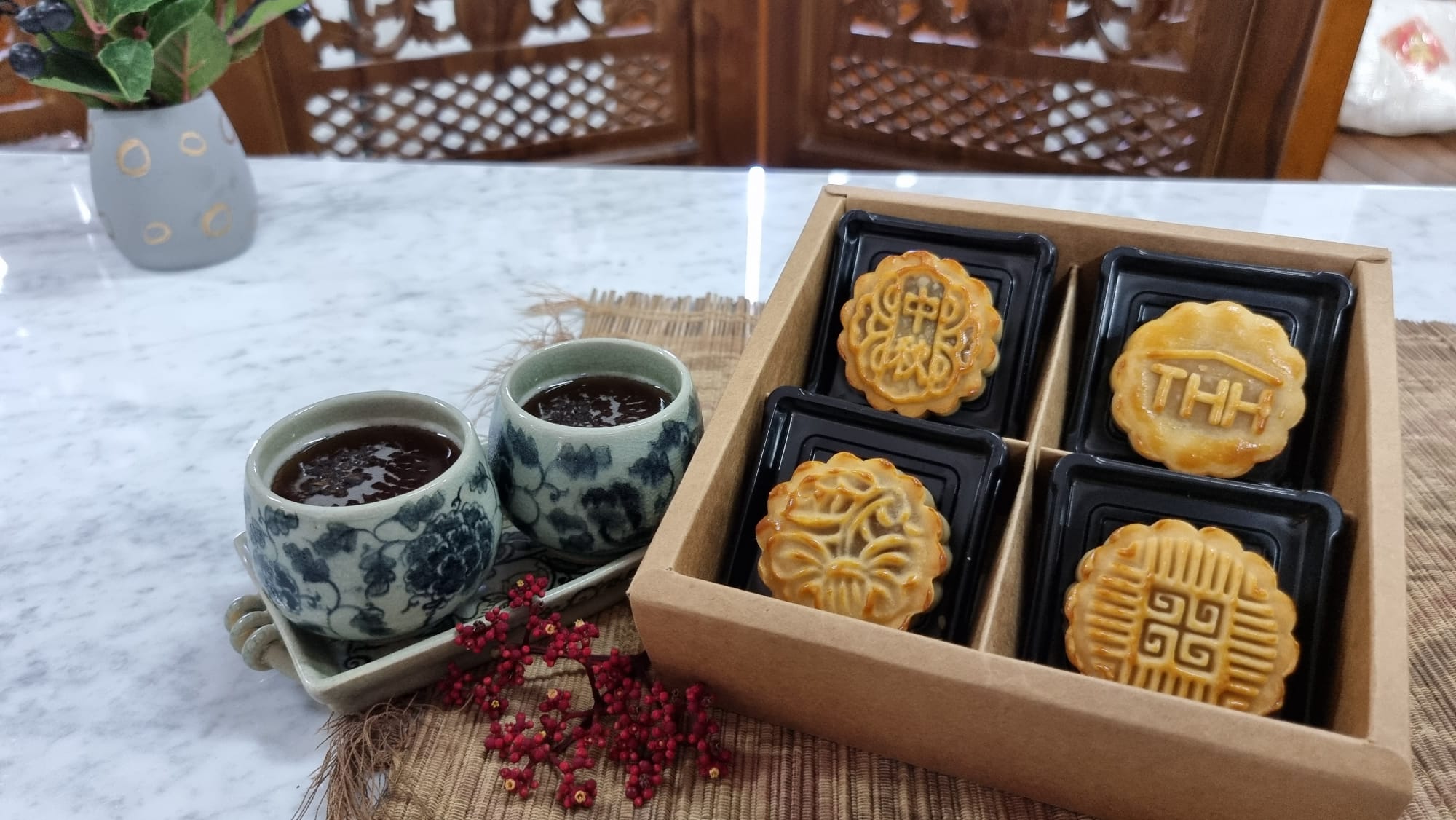
This is the first time The Helping Hand is selling mooncakes. They hope to sell 200 boxes of these traditional sweet treats to fund the work they do to help ex-offenders break free from drug addiction. All photos of mooncakes courtesy of The Helping Hand.
This mooncake festival, for the first time, THH is selling baked mini mooncakes. Having successfully sold pineapple tarts this recent Chinese New Year and cookies in April, the baking team which was formed last September felt ready to take on another sweet treat.
Said Gina Ang, who heads the baking team: “Our chief baker Ah Hock has some background in mooncake-making. He even brought traditional wooden mooncake moulds from home to try them out.”
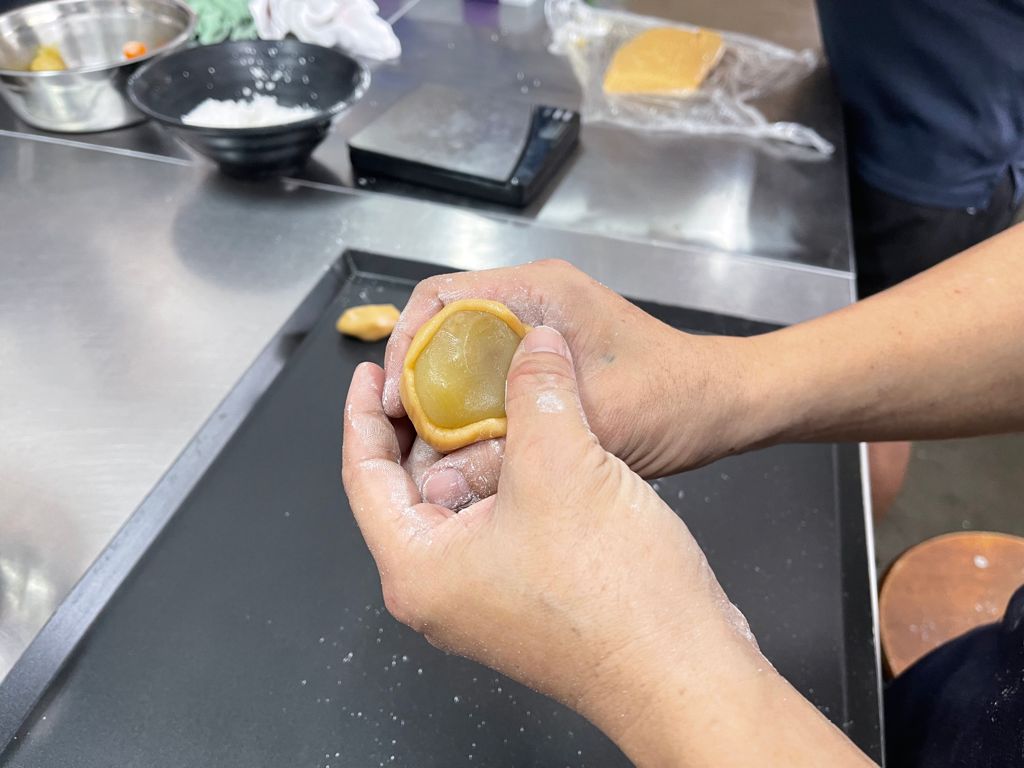
Although they considered many flavours for the mini mooncakes, in the end, the baking team went with the familiar favourites, knowing that they would be well-received.
Using a recipe passed down from Ah Hock’s family, with a few tweaks from a retired chef who volunteers at THH and tips from YouTube, THH came up with four flavours of baked mooncakes.
Each box on sale for S$16 will have a white lotus mooncake with egg yolk, a pure lotus mooncake with egg yolk, a red bean mooncake with melon seeds and a white lotus mooncake with melon seeds.
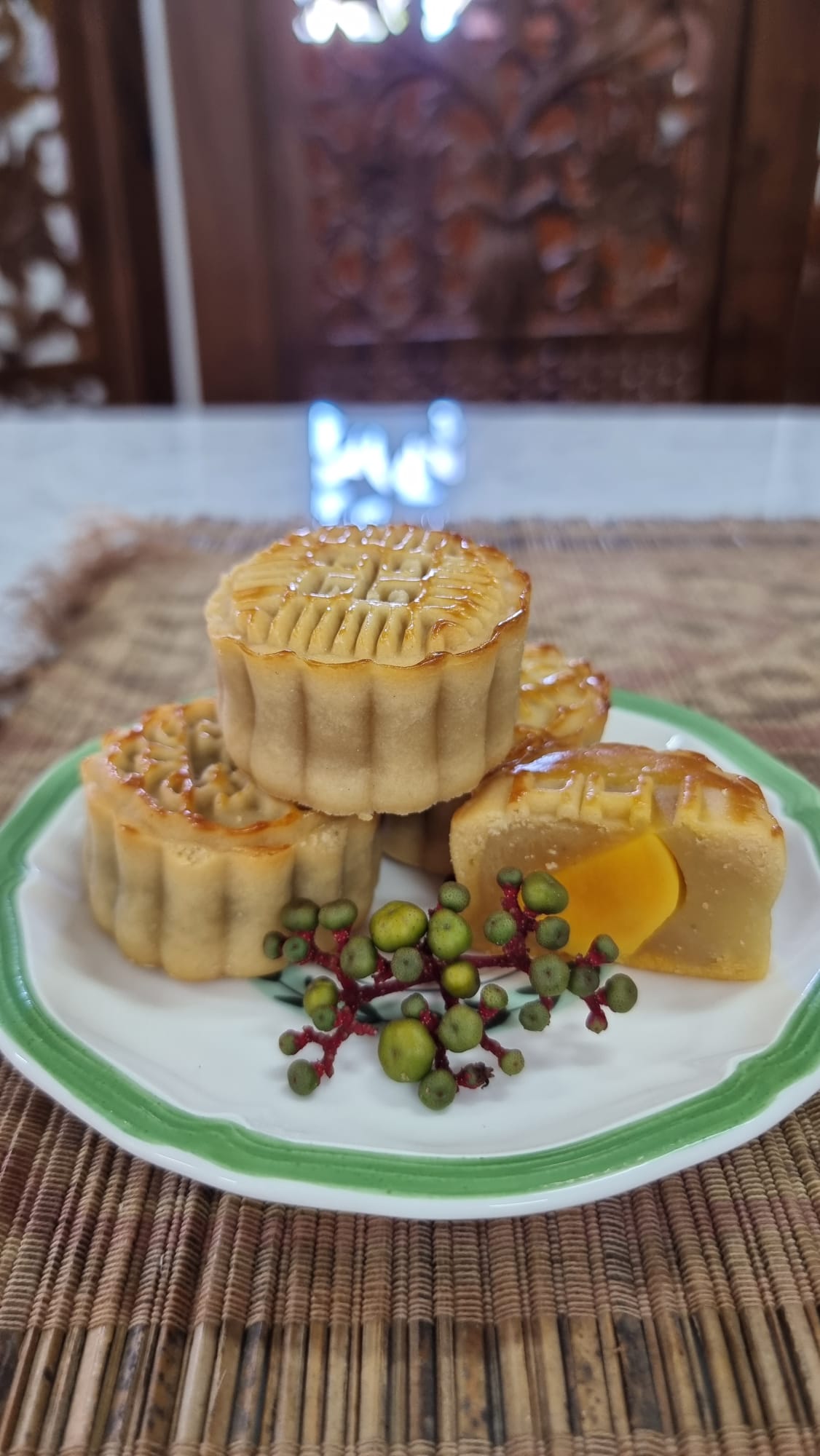
Each box of mooncakes consists of four mini mooncakes of different flavours, specially chosen to appeal to different tastes.
“This being our first time, we decided to go with the traditional flavours that are more popular with most people,” said Gina.
The team would learn that mooncake-making is delicate business.
“The hardest to get right is the skin. We tried a few types to see which worked best. Even the wash for the mooncakes which gives them the shine had to go through a few rounds.
“There were many different ways. Some said to use egg yolk with egg and a little salt, some said to add water, some said just use eggs. We tried different ones before we got it just right.”
The team – comprising Gina, Ah Hock and two other bakers – would learn that mooncake-making is delicate business. If the egg wash is not properly brushed onto the mooncake, the fine design imprinted on the mooncakes will “get out of shape” when baked.
Even getting the mooncakes out of the mould is a fine art. Squeeze the plunger too hard and the filling inside will be squeezed out as well. Not enough pressure, and the mooncakes cannot be removed from the mould.
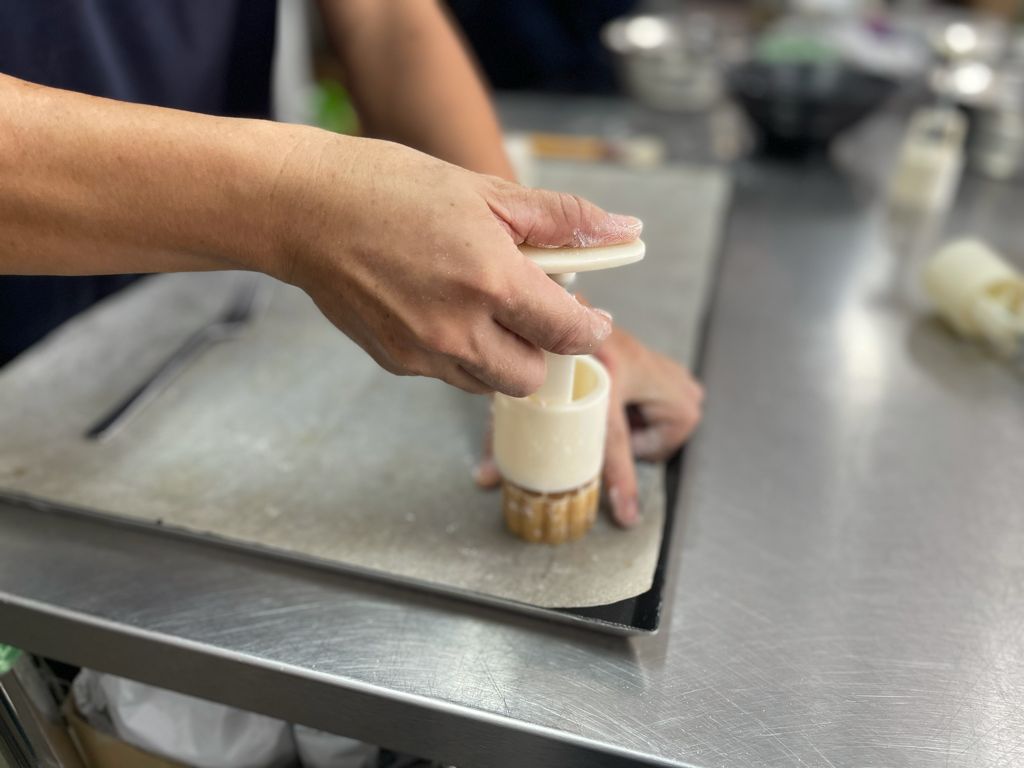
The ovens they used also yielded different results because of how they heated up differently. This affected the colour of the mooncakes.
It took one month of testing before the team finally perfected the technique and taste.
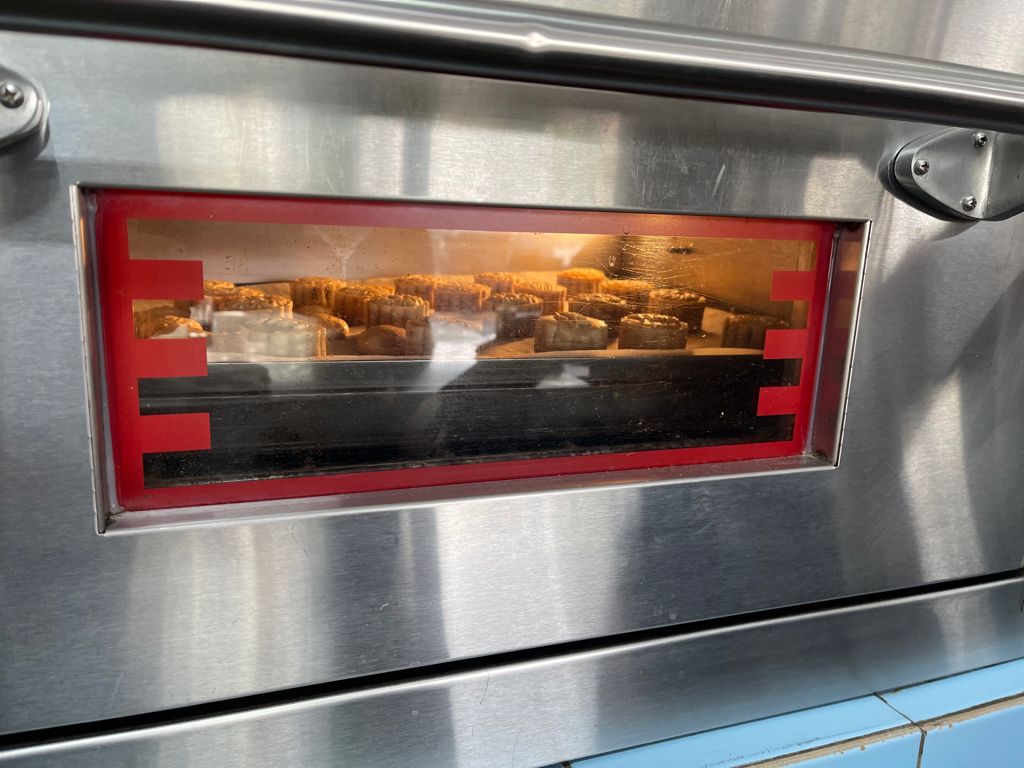
The baking team had to adjust to the different ovens they had to achieve consistency in the look of the mooncakes because each oven would heat up differently, affecting how brown the mini mooncakes would appear.
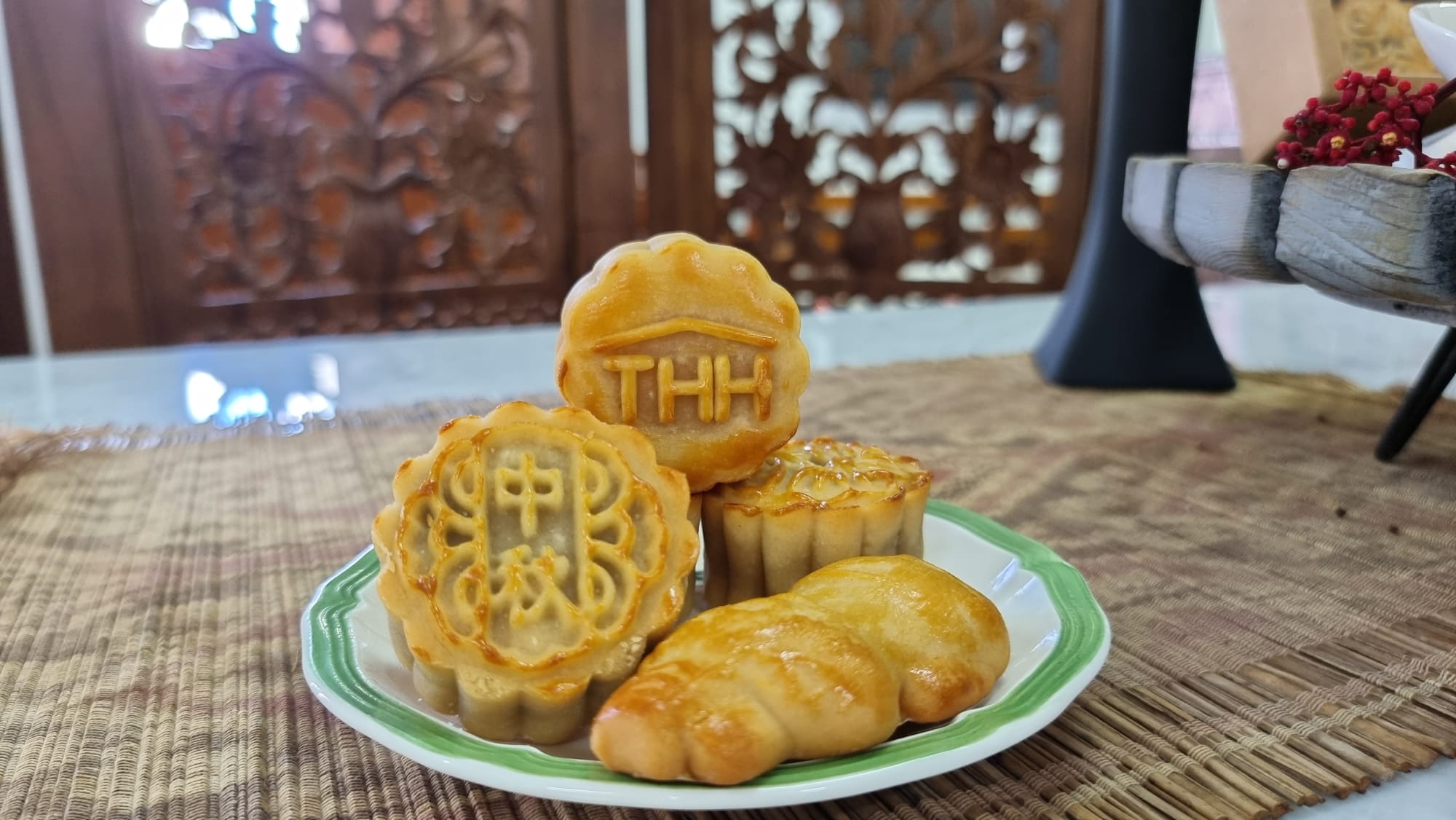
A pair of mini piglets will be given free with every three boxes of mini mooncakes bought.
The mooncakes are on sale from now to September 15. You can click here to order your mooncakes.
For every three boxes, a pair of mini piglets will be included in the order for free. Orders above S$60 will be delivered for free.
Special for Salt&Light readers!
Salt&Light readers who let The Helping Hand know that they found out about their mooncakes from Salt&Light will receive a complimentary bag of cookies with their order.
RELATED STORIES:
“If you heal me, Hallelujah. If you don’t heal me, also Hallelujah”
We are an independent, non-profit organisation that relies on the generosity of our readers, such as yourself, to continue serving the kingdom. Every dollar donated goes directly back into our editorial coverage.
Would you consider partnering with us in our kingdom work by supporting us financially, either as a one-off donation, or a recurring pledge?
Support Salt&Light